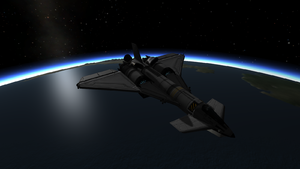Difference between revisions of "Aeris 4A"
(+images; *moved mission profile into separate article; *capabilities in text not list;) |
(Added some possible improvements which can be made to the stock design.) |
||
| Line 23: | Line 23: | ||
Its engines are supposed to be controlled through action groups, not through staging. | Its engines are supposed to be controlled through action groups, not through staging. | ||
| + | |||
| + | == Possible improvements == | ||
| + | |||
| + | Whilst the supplied plane does perform ok, there is some scope for tweaking and/or improving the design, with some quick and easy changes. These are just some basic ideas and things to try out: | ||
| + | |||
| + | * Change the [[LV-T30 Liquid Fuel Engine]] to the [[Toroidal Aerospike Rocket]], to reduce the chance of a tail strike on takeoff and landing, and arguably improve aesthetics. | ||
| + | * Change action groups 1 & 2 to toggle the engines, instead of just activating them. | ||
| + | * Remove the [[Inline Advanced Stabilizer]], as it's really not necessary with the changed SAS system. The cockpit now provides both sufficient reaction wheel torque and SAS. Atmospheric handling is arguably improved with less torque. | ||
| + | * Add struts between the cockpit and fuel tank or wings, to reduce flexing around the RCS tank and docking port. | ||
| + | * Add a battery and solar panel, for extended duration orbiting. | ||
| + | * Change the [[AV-R8 Winglet]]s to [[Advanced Canard]]s on the nose, and [[Standard Canard]] on the tail, for improved handling. | ||
| + | |||
| + | Remember to check the centres of mass and lift after making significant changes, and adjust the wings forwards or backwards to compensate, if necessary. | ||
== See also == | == See also == | ||
Revision as of 19:42, 15 November 2013

The Aeris 4A is a manned stock spaceplane with single-stage-to-orbit capabilities. With sufficient piloting skill it is capable of reaching Kerbin orbit, docking with another craft in orbit and returning safely to the ground without decoupling any parts.
Features
The Aeris A4 is equipped with two TurboJet Engines for atmospheric flight. The intake air is provided by four Radial Air Intakes and two Ram Air Intakes. For orbital flight is one LV-T30 Liquid Fuel Engine available.
Six RV-105 RCS thrusters for orbital control are added which allow rotational or translational movement. Although it is not possible to translate sideways as all thrusters are pointing upwards, downwards, forwards or rearwards.
With an Inline Clamp-O-Tron docking port facing upwards it is possible to dock with other craft.
Action Groups
For faster switching between atmospheric and orbital flight, the Aeris 4A has four action groups predefined:
- Activate turbojet engines
- Activate liquid fuel engine
- Shutdown jet engines, toggle intakes
- Open docking port
Its engines are supposed to be controlled through action groups, not through staging.
Possible improvements
Whilst the supplied plane does perform ok, there is some scope for tweaking and/or improving the design, with some quick and easy changes. These are just some basic ideas and things to try out:
- Change the LV-T30 Liquid Fuel Engine to the Toroidal Aerospike Rocket, to reduce the chance of a tail strike on takeoff and landing, and arguably improve aesthetics.
- Change action groups 1 & 2 to toggle the engines, instead of just activating them.
- Remove the Inline Advanced Stabilizer, as it's really not necessary with the changed SAS system. The cockpit now provides both sufficient reaction wheel torque and SAS. Atmospheric handling is arguably improved with less torque.
- Add struts between the cockpit and fuel tank or wings, to reduce flexing around the RCS tank and docking port.
- Add a battery and solar panel, for extended duration orbiting.
- Change the AV-R8 Winglets to Advanced Canards on the nose, and Standard Canard on the tail, for improved handling.
Remember to check the centres of mass and lift after making significant changes, and adjust the wings forwards or backwards to compensate, if necessary.
See also
- Tutorial:Aeris 4A mission, a tutorial on how to launch this craft

